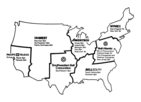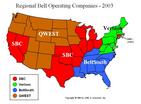Sens. Byron Dorgan (D-N.D.) and Olympia Snowe (R-Maine) today introduced the Internet Freedom Preservation Act of 2007.Why is this important, beyond all the reasons previously discussed? Continue reading
Beijing News v. Tom.com
The suit is only for damages of $400,000, but it’s an interesting test case. Is suing your competitors good risk management? I guess we’ll see.
-jsq
FCC and BPL
In other FCC news, this a bit old, the
Not happy with the limited choices you have for broadband Internet access? That may change. The FCC has just announced it plans to back broadband over powerline (BPL) technology, so you may eventually get Net access from your local utility. And AT&T and the other telcos certainly aren’t happy about it.
AT&T’s Newest Enemy: Your Electric Utility by Preston Gralla, Network Computing, 4 August 2006
Personally, I’m dubious that BPL will work well enough to provide much competition, but at least it’s something.
This is also a reminder that the telcos are not the only high-power lobby group in telecommunications.
-jsq
AT&T from Sea to Sea

|
 |
Doubtless everyone has heard that the FCC approved the merger of Bellsouth with AT&T, and AT&T has moved ahead with accomplishing that, with various implications for cellphone carrier branding, repatriating jobs that are outsourced, etc.
Some of the provisions are interesting, for example, for a year starting summer 2007 AT&T will give out a free DSL modem to anyone willing to switch from dialup to DSL. On the one hand it’s good to see some U.S. carrier finally doing what Softbank did five or more years ago in Japan. On the other hand, without dialup, you have even less choices than you did before for ISPs.
But what does it mean for net neutrality? Ars Technica thinks it’s good, because of last-minute net neutrality concessions from the corporate merger candidates, and quotes a prominent net neutrality backer:
Professor Tim Wu, writing for Savetheinternet.com, praises the neutrality provisions, but he does note that they are not total. "The agreement does not prevent AT&T from treating different media carried on the Internet differently," he says, "so long as the carrier does not discriminate between who is providing the content. AT&T, under this agreement, may speed all the Internet video traffic on its network (to compete, for example, with cable). But it cannot pick and choose whose video traffic to speed up. In short, AT&T must treat like traffic alike– that is the essence of the agreement."
AT&T agrees to strong network-neutrality provisions, by Nate Anderson, 29 Dec 2006
Prof. Wu also notes that these provisions don’t apply to AT&T’s longhaul IP infrastructure (only to its first and last mile infrastructure); they don’t apply to IPTV; and they only last for two years or until Congress passes a net neutrality act.
And one of those exceptions could be a big loophole.
Continue readingClimate Risk Management
The NY Times had an article yesterday about a "middle stance" about global warming:
They agree that accumulating carbon dioxide and other heat-trapping smokestack and tailpipe gases probably pose a momentous environmental challenge, but say the appropriate response is more akin to buying fire insurance and installing sprinklers and new wiring in an old, irreplaceable house (the home planet) than to fighting a fire already raging.
Middle Stance Emerges in Debate Over Climate, By ANDREW C. REVKIN, New York Times, January 1, 2007
Hm, this sounds like risk management.
Continue readingTaiwan Earthquakes Boil Internet
 I’ve seldom seen as much disruption of the Internet
as is still being caused by the
Taiwan Earthquakes of 26-27 December.
Six undersea cables cut at once may be a record,
as may disruptions from Taiwan to Nepal.
I’ve seldom seen as much disruption of the Internet
as is still being caused by the
Taiwan Earthquakes of 26-27 December.
Six undersea cables cut at once may be a record,
as may disruptions from Taiwan to Nepal.
-jsq
Aggregate, Collective, and Collaborative
For some time I’ve been saying that aggregate damage requires collective action. Recently I ran across a slightly different take on that:
Collective adversity mandates collaborative adaptation
I found this quote used by someone else as a one sentence summary of the social effects of the three laws of thermodynamics (often paraphrased as you can’t win, you can’t break even, and you can’t get out of the game). It may be true that you, singular, can’t win, etc. But we can win if we collaborate and adapt….
Now that’s risk management!
-jsq
Net Neutrality and Rights of Way
The Bells claim privileges based on over 100 years of practice that may or may not coincide with the intent and limits of the original deals, but the resulting laws explicitly require a public purpose in exchange for the right-of-way concessions.I hadn’t made the connection between net neutrality and rights of way, but clearly there is one. And that’s not all! Continue readingThe obligations established on a state by state basis sometimes include build-out requirements or other compensation, but they all specify that access to state right-of-way at largely no cost or limit requires common carrier status (aka net neutrality.) The loss of common carrier status invalidates the contracts. The Bell companies have no access to state right-of-way for deployment of private, closed, non-neutral, non-common carrier network deployments.
Why Even Bells Need Net Neutrality, By Daniel Berninger, Written by Om Malik, Posted Tuesday, May 9, 2006 at 7:07 AM PT
Reputation as Asset
Postscript: Mark my words. Five years from now, the office of CRO will be commonplace among global corporations. And ten years from now, the CRO will vie with the CFO as the most likely path to the office of CEO. Reputation is a corporation’s most valuable capital asset and those who manage it best will be rewarded handsomely.On the one hand, I get a bit of reflex reaction to that suggestion, of “is this just more perception over content, of which we already have too much in the corporate world?” Continue readingEmpty Seat at the Table Devastating in HP Debacle Jon Harmon, Force for Good, 10 December 2006.
Exploding TV
What if they’re fighting the last war? Jeff Pulver points out:
Back on August 29th I posted a list of “TV Shows Only Available on the Net.” The following day, Network2 was born. Today 232 shows can be found in the Network2 guide.Exploding TV on the Net: From 80 to 230 shows in 3 Months on Network2, Jeff Pulver, The Jeff Pulver Blog, December 13, 2006
Seems like it would be better risk management for those telcos, not to mention for the public, to be dealing with what people actually want.
-jsq